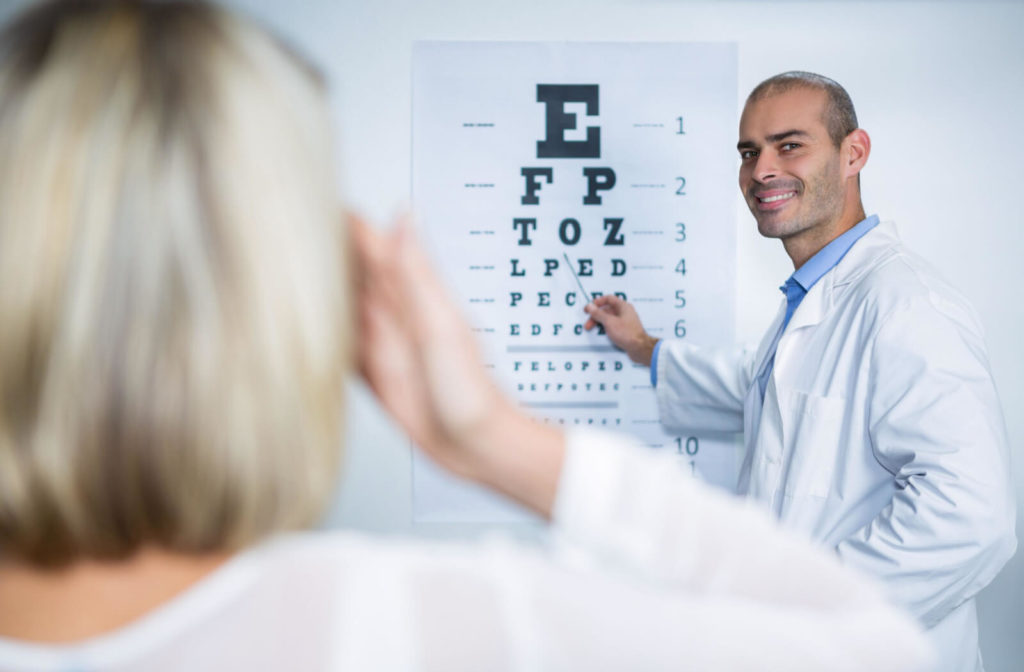Why Choosing an Eye Doctor Optometrist is Vital for Your Eyes
Why Choosing an Eye Doctor Optometrist is Vital for Your Eyes
Blog Article
Comprehending the Comprehensive Function of an Eye Doctor in Modern Eye Care
In the advancing landscape of health care, the range of an optometrist's duty has substantially widened, expanding well past the confines of typical vision adjustment. With advancements in technology and an increasing focus on preventative treatment, eye doctors are integral in diagnosing and managing chronic eye conditions, while likewise taking part in very early illness discovery. Their experience in sophisticated diagnostic strategies such as optical coherence tomography is invaluable. Yet how do these obligations converge with their duty in advertising total eye health, and what does this mean for patient outcomes in a collaborative health care environment?
Expanded Scope of Method
In recent years, the duty of eye doctors has actually developed substantially, with many professionals currently accepting a broadened extent of practice that extends past conventional eye assessments. Their obligations currently incorporate a broad array of solutions, consisting of recommending medications for ocular problems, taking care of persistent eye diseases, and executing small medical treatments.
Further, optometrists are currently much more involved in joint care, functioning very closely with ophthalmologists, health care doctors, and other health care professionals to make certain alternative client care. This interprofessional cooperation is essential in taking care of complex cases that require a multidisciplinary method. In addition, eye doctors are playing a pivotal duty in public health and wellness efforts, such as vision testings and eye wellness education and learning, targeted at boosting community health and wellness results.
The broadened extent of technique for optometrists not just boosts their capability to supply detailed treatment however additionally deals with the expanding need for easily accessible and efficient eye treatment solutions, adding to general medical care enhancements.
Very Early Disease Detection
Very early discovery of eye conditions is progressively ending up being a prime focus in the increased role of optometrists. As primary eye care suppliers, optometrists are uniquely placed to determine very early signs of eye conditions such as glaucoma, macular degeneration, diabetic retinopathy, and cataracts. This essential role is crucial, as very early medical diagnosis can significantly improve the monitoring and prognosis of these problems, possibly stopping vision loss and improving individual results.
Optometrists use comprehensive eye evaluations to find subtle changes in vision and eye wellness. The capacity to acknowledge very early signs of systemic wellness issues, such as hypertension and diabetic issues, via ocular indicators even more highlights the importance of normal eye examinations.
Furthermore, optometrists play an essential duty in person education and learning, stressing the importance of routine eye assessments as component of overall health and wellness upkeep. By cultivating a proactive approach to eye treatment, optometrists contribute considerably to public health and wellness, guaranteeing diseases are caught and taken care of successfully prior to they can advance.
Advanced Diagnostic Techniques
Advanced diagnostic techniques have actually reinvented the technique of optometry, making it possible for specialists to detect and keep track of eye illness with unprecedented accuracy. These improvements have actually transformed the optometric landscape, permitting extra innovative assessment and treatment methods. Technologies such as optical comprehensibility tomography (OCT) provide high-resolution, cross-sectional photos of the retina, facilitating very early discovery of problems like glaucoma and macular deterioration. This non-invasive technique has come to be essential in modern optometry, offering in-depth insights into retinal layers.
One more critical improvement is electronic retinal imaging, which catches thorough views of the retina utilizing high-definition electronic cameras. This innovation is important in identifying changes in retinal structure over time, thus assisting in the administration of conditions like diabetic person retinopathy. Aesthetic area testing, enhanced by computer-aided systems, enables specific mapping of an individual's visual field, crucial in tracking and diagnosing glaucoma development.
Corneal topography, another notable analysis device, produces comprehensive maps of the cornea's surface. This is specifically helpful in suitable call lenses and planning refractive surgery. These official site innovative diagnostic strategies collectively allow optometrists to supply proactive, targeted care, making certain better individual end results and enhancing their critical role in eye wellness management.
Handling Chronic Eye Problems
Managing persistent eye conditions is a keystone of optometric treatment that needs an extensive understanding of different eye diseases and their long-term ramifications. Eye doctors play a critical role in surveillance, managing, and diagnosing conditions such as glaucoma, diabetic retinopathy, and age-related macular deterioration. These conditions, if left neglected, can lead to significant aesthetic disability or blindness, highlighting the vital relevance of continuous treatment and management.
Optometrists use a variety of analysis devices, consisting of optical comprehensibility tomography (OCT), aesthetic field testing, and fundus digital photography, to evaluate the progression of these persistent conditions. By carefully keeping track of modifications in ocular health, optometrists can readjust therapy strategies to reduce illness development. This may involve suggesting medications, recommending lifestyle alterations, or coordinating with eye doctors for surgical interventions when necessary.

Duty in Preventive Care
Precautionary care is an essential element of optometry that concentrates on maintaining eye wellness and avoiding the beginning of ocular diseases. Eye doctors play an important function in early detection and avoidance, employing normal eye examinations to recognize risk factors and subtle adjustments in eye health and wellness. Opticore Optometry. These assessments are not simply about vision adjustment however incorporate a detailed analysis of eye functions and frameworks, making it possible for the identification of problems such as glaucoma, cataracts, and macular degeneration at an onset
In enhancement to diagnostics, optometrists educate patients on lifestyle choices that advertise eye health and wellness, such as correct nutrition, UV security, and the significance of routine eye examinations. They recommend on the correct use of electronic tools to avoid digital eye strain, a growing problem in the electronic age. Optometrists likewise offer advice on protective eyeglasses for work-related and leisure tasks, minimizing the danger of injury.
Preventive eye care reaches systemic wellness problems that manifest in the eyes, such as diabetes and high blood pressure. By working together with various other healthcare experts, optometrists add to alternative individual treatment, stressing the interconnectedness of systemic and ocular wellness. This proactive technique is necessary in securing visual skill and total wellness.
Final Thought
Optometrists now inhabit a critical function in modern-day eye treatment, characterized by an increased range that includes diagnosing and anchor handling chronic eye conditions, prescribing drugs, and doing minor surgeries (Eye Doctor Optometrist). Their competence in very early disease detection is boosted by sophisticated diagnostic methods such as optical comprehensibility tomography and digital retinal imaging. By highlighting preventative care and person education and learning, eye doctors add substantially to general eye health and wellness, working together with various other health care specialists to make certain efficient and thorough individual end results

In enhancement to diagnostics, eye doctors enlighten patients on lifestyle options that advertise eye health, such as appropriate nourishment, UV security, and the importance of routine eye examinations.Preventative eye care prolongs to systemic wellness issues that show up in the eyes, such as diabetic issues and hypertension.Optometrists now inhabit an essential function in contemporary eye treatment, identified by a broadened range that consists of diagnosing and managing chronic eye conditions, recommending drugs, and executing minor surgical treatments.
Report this page